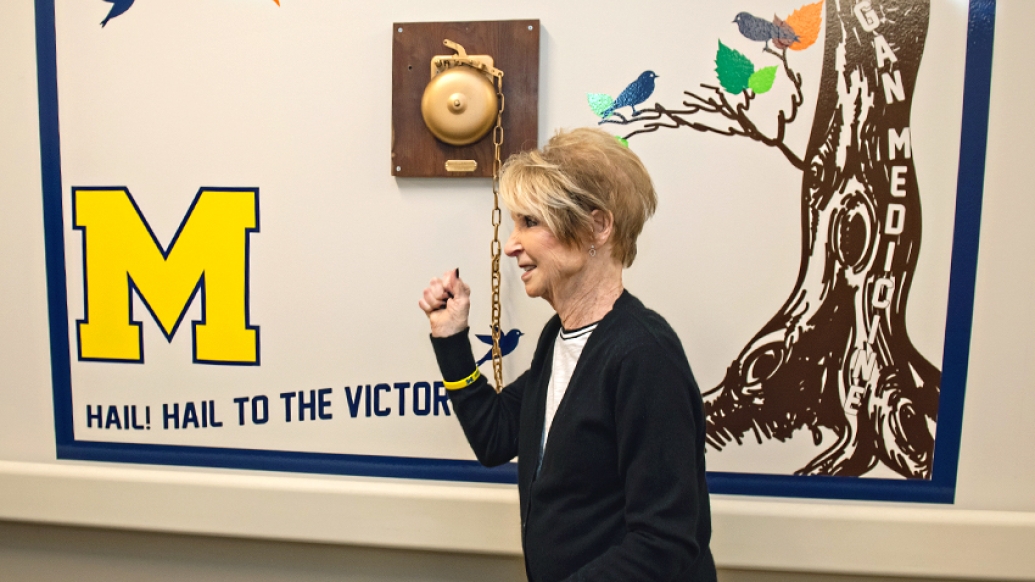One patient overcomes treatment fears and signs on for clinical research.
7:00 AM
Author |

Joannie Barker makes 80 years old look easy and is often busy going out to dinner, working on her computer and seeing the latest movies.
LISTEN UP: Add the new Michigan Medicine News Break to your Alexa-enabled device, or subscribe to our daily audio updates on iTunes, Google Play and Stitcher.
She didn't let a lung cancer diagnosis stop her from enjoying time with family and friends. Yet, walking into the University of Michigan Rogel Cancer Center for her first day of radiation therapy, she admits she was scared.
"I was terrified to be told at my age that I had lung cancer," Barker says.
"The path of rocks walking in was one of the most overwhelming things I had seen in my life. When I walked into the radiation room, I thought I was going to pass out."
Barker is referring to the path of rocks painted with inspirational messages from other cancer patients that leads to the Department of Radiation Oncology.
SEE ALSO: Thriving After Lung Cancer, Thanks to a Clinical Trial
She quickly learned that technicians like Lauren Jankowski, Travis Hughes and Dana Bentley use humor, music and other techniques to put patients at ease.
"From that day forward, we have laughed, joked and listened to music," Barker says. "I even made them listen to Queen. I'd walk in and we'd hug. I'd walk out and we'd hug."
She learned from her care team that her treatment goal was twofold: first, shrink the tumors on her lung and lymph nodes and second, ring the bell that signifies the end of cancer treatment.
Participating in a Clinical Trial
Barker's cancer journey began with a bout of pneumonia that resulted in the diagnosis of stage 3 inoperable lung cancer.
Her Rogel Cancer Center oncologist, Shirish Gadgeel, MBBS, recommended a combination of chemotherapy and radiation therapy given concurrently for six weeks.
MORE FROM MICHIGAN: Sign up for our weekly newsletter
He referred Barker to his colleague, Shruti Jolly, M.D., in the Department of Radiation Oncology, who explained that for lung cancer patients who cannot undergo surgery, radiation therapy is used to treat the cancer aggressively. High doses would be delivered to the tumor while avoiding the esophagus, normal lung tissue and heart in order to avoid side effects from treatment.
Barker also had the opportunity to enroll in a clinical trial designed by Rogel Cancer Center researchers and led by Jolly to evaluate ways to individualize and adapt radiation treatment based on each patient.
"In this trial, patients undergo a PET/CT scan about four weeks into the six weeks of treatment to see how the tumor is responding," says Jolly, an associate professor of radiation oncology. "Then, a new radiation plan is generated to give higher doses to still active areas of tumor and further avoid doses to normal tissue."
SEE ALSO: New Options and New Hope in Lung Cancer Treatment
In Barker's case, her cancer responded well to radiation at the four-week mark.
"I was a pretty happy lady. The trial charted my progress," Barker says. "It was in my best interest and in the interest of others to join the trial. They knew they could dial down the radiation to lessen the focus on the lymph nodes and focus on the tumor area."
Barker also received chemotherapy each week, experiencing extreme fatigue and nausea. However, most weeks she was still able to maintain her normal routine and activities.
Ringing the Victory Bell
Barker completed treatment in December 2018 and, on her last day of radiation therapy, rang the victory bell surrounded by her care team and the family members who accompanied her to every appointment.
After a 4-week break, she began immunotherapy treatment, which her doctors believe will maximize her chances of being cured of her lung cancer.
For now, she is aiming to get her strength back and works out with a trainer two days a week. Even during treatment, she never missed a day of putting on makeup and gets her hair done twice a week.
"It's the new me," Barker says. "Yesterday I looked at the raindrops on the tree in my courtyard and it was so pretty. You appreciate things differently than before."

Explore a variety of healthcare news & stories by visiting the Health Lab home page for more articles.

Department of Communication at Michigan Medicine
Want top health & research news weekly? Sign up for Health Lab’s newsletters today!





